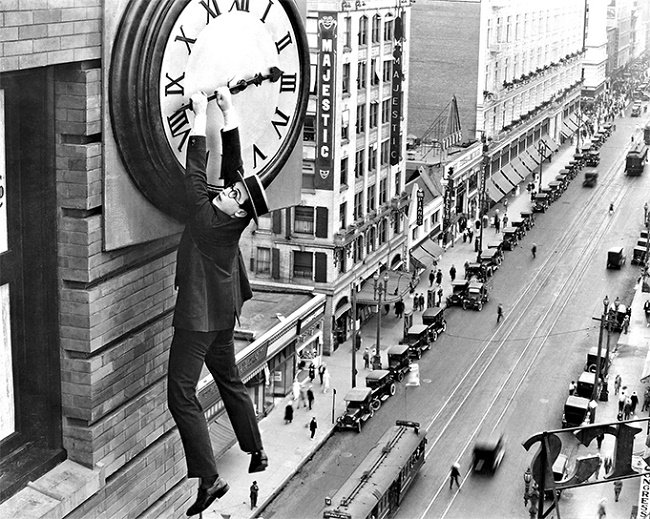Honrando a Harold Lloyd, el hombre de las gafas (Esp | Eng)
Tres grandes figuras cimientan el género cómico de la cinematografía universal, durante el período mudo (y más allá): Charles Chaplin, Buster Keaton y Harold Lloyd. A los dos primeros he dedicado posts en #Hive (ver 1 y 2). Quisiera saldar hoy mi deuda con el tercero.
Three great figures are the foundation of the comic cinema of universal cinematography, during the silent period (and beyond): Charles Chaplin, Buster Keaton and Harold Lloyd. To the first two I have dedicated posts in #Hive (see 1 and 2). I would like to settle my debt with the third one today.

Dominio público | Public Domain
Insoslayable cuando se trata del gran cine cómico, hablar de Harold Lloyd, nacido el 20 de abril de 1893 en Nebraska (EUA), quien fue más que un actor; fue un compositor de filmes en sus escenas y secuencias, concebidas, según se sabe, con meticulosa atención en todos sus aspectos, y, no siendo el director o productor, en la práctica fungió de tales.
Sin haber alcanzado el éxito sentimental y comercial de un Charlot, el querido personaje creado por Chaplin, Harold Lloyd llegó a proponer uno que identificaba al común individuo estadounidense —de clase media, diríamos— propio de la urbe de la década del 20. Lo que logró, en primer lugar, por su apariencia física —traje citadino, sombrero de paja y lentes de pasta—, y, luego, con su perfil de persona normal, sobria, comedida. Es el conocido como "hombre de las gafas". Sin embargo, este personaje llegará a tener un comportamiento extraño, dinámico y cercano al absurdo, con gags que provocarán la tensión y el suspenso, o la hilaridad propiciada por una hiperactividad cercana al ridículo.
When it comes to great comic cinema, it is unavoidable to speak of Harold Lloyd, born on April 20, 1893 in Nebraska (USA), was more than an actor; he was a film composer in his scenes and sequences, conceived, as is known, with meticulous attention in all its aspects, and, not being the director or producer, in practice he acted as such.
Without having achieved the sentimental and commercial success of a Charlot, the character often created by Chaplin, he came to propose one that identified the common American individual of the city of the 20's, middle class, we would say. What he achieved, firstly, by his physical appearance -city suit, straw hat and horn-rimmed glasses-, and, then, with his profile of a normal, sober, restrained person. He is known as "the man with glasses". However, this character will come to behave strangely, dynamically and close to the absurd, with gags that will provoke tension and suspense, or hilarity caused by a hyperactivity close to the ridiculous.

Lloyd había presentado este personaje inicialmente en el cortometraje Sobre la valla (Over the Fence) de 1917, y lo seguirá usando en los siguientes cortos y mediometrajes. Pero alcanzará su definitiva afirmación con dos de sus largometrajes: El hombre mosca (Safety Last!) de 1923 y El estudiante novato (The Freshman) de 1925.
En el primero protagoniza a un joven vendedor de un gran almacén que, tras hacerse pasar por gerente para atraer a su enamorada y a su clientela, acepta la oferta de mil dólares por escalar un edificio. Se condensa su mayor fuerza cinematográfica en la última parte del filme, donde lo actoral se combina con la comicidad y la tensión. Se trata también de una discreta o simulada crítica a la sociedad, por sus patrones de éxito, a la población común que se deja llevar por la espectacularidad —nada lejos de la actualidad—, e incluso al tiempo de la vida, en la imagen del reloj desmembrado.
Lloyd had initially introduced this character in the 1917 short film Over the Fence, and he would continue to use it in the following shorts and medium-length films. But he will reach his definitive affirmation with two of his feature films: Safety Last! of 1923 and The Freshman of 1925.
In the former, he stars as a young salesman in a department store who, after posing as a manager to attract his sweetheart and clientele, accepts the offer of a thousand dollars to climb a building. His greatest cinematic strength is condensed in the last part of the film, where acting is combined with comedy and tension. It is also a discreet or simulated critique of society, of its patterns of success, of the common people who get carried away by the spectacular -not far from the present-, and even of the time of life, in the image of the dismembered clock.
Para los que no la conocen, o para los que la quieren recordar, va aquí | For those who don't know it, or for those who want to remember it, here it goes:
Y el segundo largometraje aludido, nos presenta la historia de un joven estudiante universitario que busca refrenar las bromas de sus compañeros —lo que hoy se conoce como "bullying"— convirtiéndose en exitoso jugador de fútbol americano. Interpretando a un individuo de similar carácter en su marginalización social, igualmente su carga mayor de comicidad —en el absurdo, lo burlesco— estará en la parte final. Así lo podrán disfrutar en esta grabación:
And the second feature film presents the story of a young college student who seeks to curb the jokes of his classmates –what is known today as "bullying"– by becoming a successful soccer player. Playing an individual of similar character in his social marginalization, his greatest load of comedy –in the absurd, the burlesque– will be in the final part. You can enjoy it in this recording:
Referencias | References:
https://es.wikipedia.org/wiki/Harold_Lloyd
https://en.wikipedia.org/wiki/Harold_Lloyd
https://www.biografiasyvidas.com/biografia/l/lloyd_harold.htm




https://inleo.io/threads/josemalavem/re-josemalavem-2ybmrkmnl
The rewards earned on this comment will go directly to the people ( josemalavem ) sharing the post on LeoThreads,LikeTu,dBuzz.
Excelentes recomendaciones, a veces el arte nos brinda historia y temas importantes que vuelven a la actualidad. No todo tipo de gustos, pero una opción extraordinaria del arte.
Gracias por compartir.
Saludos
Gracias, @slwzl. Saludos.